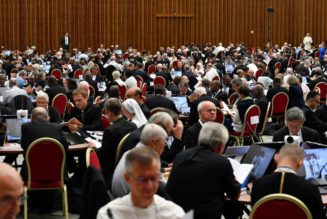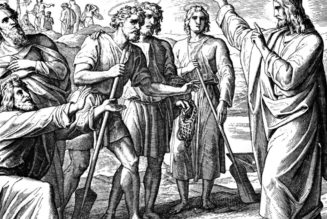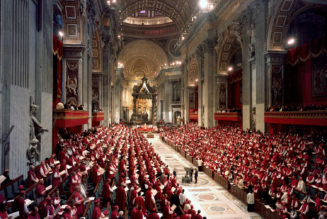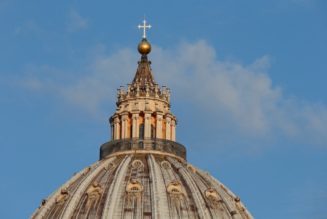, June 25, 2020
 Sunday’s readings (the 13th Sunday in Ordinary Time, Year A) touch on one of the core question of our time, and give a surprising answer.
Sunday’s readings (the 13th Sunday in Ordinary Time, Year A) touch on one of the core question of our time, and give a surprising answer.
The question is, “What makes me me?” and you see the consequences of the wrong answer all around us, in everything from protestors tearing down statues and rejecting their own history to gender ideology teaching people to reject the evidence of their own bodies.
This is because from the very beginning, “I decide who I am” has been a recipe for disaster.
That’s what Lucifer said — “I will not serve!” — and he plummeted to earth and his new home, a lake of fire. Adam and Eve were tired of being defined by God, and wanted to define themselves, so they reached out to the tree of the knowledge of good and evil. Their disobedience brought them death.
Thereafter, salvation history was the story of Israel having to learn to accept God’s definition of who they were to be; the people of the book, the law and the Temple. To this day, those who clutch at their own lives and try to make themselves what they want to be lose out; only those who give themselves away find themselves.
That’s because we are made in the image and likeness of God, and God is self-gift, the Father to the Son, the Son to the Father, and the Holy Spirit proceeding from them both. To “Become who you are,” as St. John Paul II put it, the human person must follow the same Law of the Gift.
But Jesus takes this one step further.
He wants us to do more than give ourselves to our loved ones and communities. He wants us to love him above all. More than our parents. More than our children. More than our very selves. And he wants our love for him to accept suffering and setback.
“Whoever loves father or mother … son or daughter … more than me is not worthy of me,” he says, “And whoever does not take up his cross and follow after me is not worthy of me.”
St. Paul explains how this works in Baptism.
We tend to think of the baptismal waters washing our sins away. For the early Christians, though, the baptismal font wasn’t a bath — it was a drowning pool. It didn’t simulate washing, it simulated dying.
“We were indeed buried with him through baptism into death, so that, just as Christ was raised from the dead by the glory of the Father, we too might live in newness of life,” Paul says in the Second Reading. “If, then, we have died with Christ, we believe that we shall also live with him. … [H]e died to sin once and for all; as to his life, he lives for God. Consequently, you too must think of yourselves as dead to sin and living for God in Christ Jesus.”
Paul meant that in baptism you actually were killed and reborn. Think of it like your reemergence after a serious illness or a near-death experience. Everything is different. You are new person.
Only, after Baptism, that new person you are is united utterly to Christ.
Here is where Jesus’s message takes a beautiful turn, from being a way of suffering to a way of reward.
At first the message of Christ — “Love me more than your family and take up your cross” — sounds like the opposite of the old choice given in Deuteronomy.
There, God says, “I have set before you life and death, blessing and curse; therefore choose life.” Here, Jesus seems to say, “I set before you your life and my death on the cursed cross. Therefore, choose the curse.”
But if you look at Sunday’s Gospel, you see seven lines about our sacrifice but 11 lines about our rewards.
“Whoever receives you receives me. Whoever gives only a cup of water … he will surely not lose his reward,” Jesus says.
This is consoling in two ways. First, it reassures us that we will receive far more than a life of suffering. If giving a cup of water is rewarded, what about giving your whole life? Second, it includes the important subtext that those who follow Christ will come across many, many people who will welcome and bless us.
The first reading about Elisha and the rich woman is an object lesson in how this works.
We are used to seeing the rich criticized and the poor praised in Scripture, appropriately. But here we meet a “woman of influence” who did exactly what each of us is called to do. She did not clutch at her life and possessions, but welcomed Elisha, and made her very home part of her generous gift of self. For treating her life as belonging to others, she was given the greatest reward possible: a son.
If the woman had held on to her own life, her own home, she wouldn’t have a child. It’s the same with us. If we hold on to our identity, our possessions, our selfish desires, then they are all we will have. Give them away instead. Start small, with whatever is possible, then develop the habit of giving. It will feel like a terrible cross. But soon the cross will bring untold rewards.
The proudest ideologue and the most successful self-seeker will end up a truncated version of who they could be.
Meanwhile, the humblest servile person — the housewife who dedicated her life to helping her family or the businessperson who skipped promotions and opportunities to devote more time to others — will become who they were made to be, in Christ.
Image: Students on mission to Guatemala from Benedictine College in Atchison, Kansas.
Tags: 13th Sunday in Ordinary Time A, prayer, Sunday Gospel, Sunday Readings
Never miss a post! Subscribe below to our weekly newsletter.








